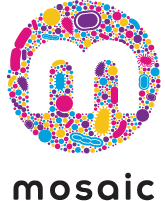The application of next-generation sequencing has transformed the study of microbial communities by providing a snapshot into these complex systems. Although the application of these methods in basic research has led to breakthrough discoveries, the translation of microbiome research to the clinic has been delayed by the limited strain-level precision and accuracy of microbiome profiling methods.
At DNAnexus, we are excited by the opportunity to apply our cloud genomics expertise to power two crowdsourcing efforts that aspire to provide unbiased benchmarking of microbial strain detection methods and to accelerate translational microbiome research in the context of human health and food safety. Mosaic, a DNAnexus community platform focusing on Microbiome Research, is launching the Clinical Strain Detection Challenge, sponsored by Janssen Research & Development. The second challenge, CFSAN Pathogen Detection Challenge, is hosted by the Center for Food Safety and Applied Nutrition (CFSAN) at FDA.
Mosaic Community Challenge: Clinical Strain Detection

The Mosaic Community Challenge: Clinical Strain Detection, hosted by Janssen Research & Development, LLC, aims to speed the translation of microbiome science into novel products by tracking the presence of certain known strains in a sample. It is critical to accurately determine the type and quantity of microbes in a sample at the strain-level in order to bring safe and effective products to market, and to precisely monitor their status within the human body. Insights from the Challenge will provide an objective comparison of the performance of different tools. Participants can submit multiple entries and see immediate results of their performance throughout the Challenge using the Mosaic Platform. Learn more about this and other Mosaic challenges at http://mosaicbiome.com/challenges/.
CFSAN Pathogen Detection Challenge
 The Center for Food Safety and Applied Nutrition (CFSAN) at FDA has pioneered the use of whole genome sequencing (WGS) for outbreak detection via their GenomeTrakr. Although this tool has already greatly improved outbreak detection and traceback, current WGS approaches rely on culturing a pathogen before sequencing. Metagenomics, defined as the study of genetic material collected directly from environmental samples, is the next evolution of GenomeTrakr foodborne pathogen initiative because metagenomics is culture-independent.
The Center for Food Safety and Applied Nutrition (CFSAN) at FDA has pioneered the use of whole genome sequencing (WGS) for outbreak detection via their GenomeTrakr. Although this tool has already greatly improved outbreak detection and traceback, current WGS approaches rely on culturing a pathogen before sequencing. Metagenomics, defined as the study of genetic material collected directly from environmental samples, is the next evolution of GenomeTrakr foodborne pathogen initiative because metagenomics is culture-independent.
As the food safety community moves to metagenomic sequencing, bioinformatics algorithms must be developed to detect pathogens amongst a mix of organisms sequenced directly from a sample. Thus, the precisionFDA team has designed a challenge as the first step towards this goal. In this challenge, participants will be asked to develop and use bioinformatics pipelines to identify the types and distribution of Salmonella strains in each of several metagenomics samples. This type of technology will expedite determining the source of foodborne illness. For more information and to get involved, please visit http://precision.fda.gov/challenges.

.png)
.png)
.png)